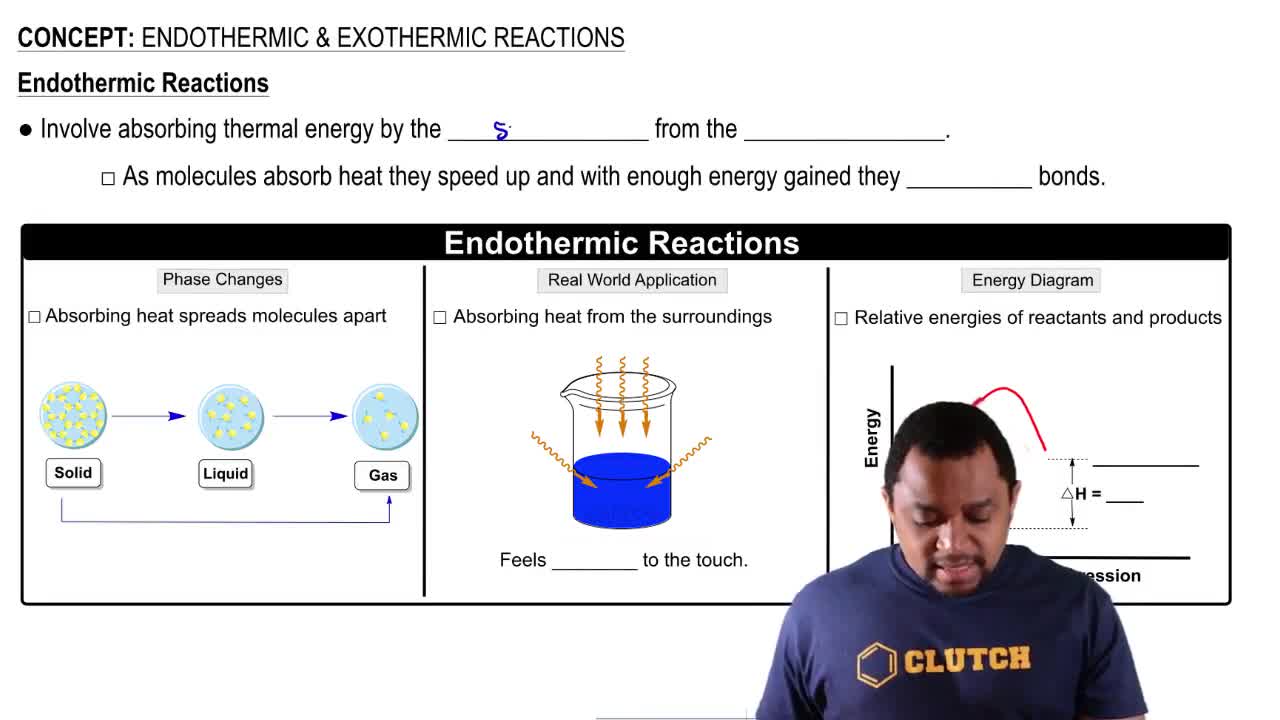For each compound, would you expect greater solubility in water or in hexane? Indicate the kinds of intermolecular forces that occur between the solute and the solvent in which the molecule is most soluble. a. glucose
Ch.13 - Solutions
Chapter 13, Problem 36a
When lithium iodide (LiI) is dissolved in water, the solution becomes hotter. a. Is the dissolution of lithium iodide endothermic or exothermic?
 Verified step by step guidance
Verified step by step guidance1
Understand the terms: Endothermic reactions absorb heat from the surroundings, causing the temperature to decrease. Exothermic reactions release heat into the surroundings, causing the temperature to increase.
Observe the effect: When lithium iodide (LiI) is dissolved in water, the solution becomes hotter, indicating a rise in temperature.
Relate the effect to the type of reaction: Since the temperature of the solution increases, it suggests that heat is being released into the solution.
Conclude the type of reaction: Based on the release of heat and the increase in temperature, the dissolution of lithium iodide in water is an exothermic reaction.
Apply the concept: In exothermic reactions like the dissolution of LiI in water, the system (LiI and water) releases heat, making the surroundings (the solution) hotter.

Verified video answer for a similar problem:
This video solution was recommended by our tutors as helpful for the problem above.
Video duration:
1mWas this helpful?
Key Concepts
Here are the essential concepts you must grasp in order to answer the question correctly.
Endothermic and Exothermic Reactions
Endothermic reactions absorb heat from their surroundings, resulting in a temperature drop in the environment, while exothermic reactions release heat, causing the surroundings to become warmer. Understanding these definitions is crucial for determining the thermal nature of a dissolution process.
Recommended video:
Guided course

Endothermic & Exothermic Reactions
Dissolution Process
The dissolution process involves the interaction between solute and solvent molecules, where solute particles are separated and surrounded by solvent molecules. This process can either absorb or release energy, depending on the strength of the interactions formed compared to those broken.
Recommended video:
Guided course

Spontaneity of Processes
Thermodynamics of Solutions
Thermodynamics in solutions examines how energy changes during the dissolution process. The enthalpy change associated with dissolution can indicate whether the process is endothermic or exothermic, which is essential for predicting temperature changes in the solution.
Recommended video:
Guided course

First Law of Thermodynamics
Related Practice
Textbook Question
598
views
Textbook Question
For each compound, would you expect greater solubility in water or in hexane? Indicate the kinds of intermolecular forces that would occur between the solute and the solvent in which the molecule is most soluble. d. ethylene glycol
712
views
Open Question
When ammonium chloride (NH4Cl) is dissolved in water, the solution becomes colder: a. Is the dissolution of ammonium chloride endothermic or exothermic? b. What can you conclude about the relative magnitudes of the lattice energy of ammonium chloride and its heat of hydration? c. Sketch a qualitative energy diagram similar to Figure 13.7 for the dissolution of NH4Cl. d. Why does the solution form? What drives the process?
Textbook Question
When lithium iodide (LiI) is dissolved in water, the solution becomes hotter. b. What can you conclude about the relative magnitudes of the lattice energy of lithium iodide and its heat of hydration?
1504
views
Textbook Question
When lithium iodide (LiI) is dissolved in water, the solution becomes hotter. c. Sketch a qualitative energy diagram similar to Figure 13.7 for the dissolution of LiI.
967
views
Textbook Question
When lithium iodide (LiI) is dissolved in water, the solution becomes hotter. d. Why does the solution form? What drives the process?
462
views
